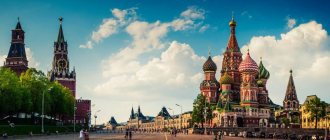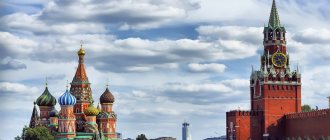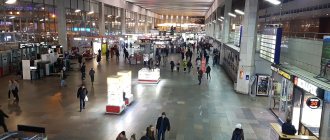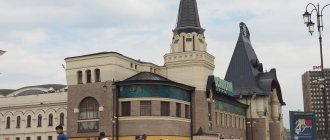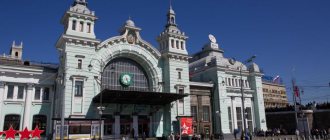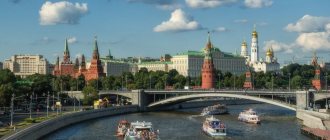How to get from Leningradsky railway station to Sheremetyevo, Domodedovo and Vnukovo airports
To Sheremetyevo Airport
There is no direct connection between Leningradsky Station and Sheremetyevo Airport. Passengers will travel by metro and Aeroexpress or by metro and bus (minibus):
- Metro + Aeroexpress Take the Circle Line metro to the Belorusskaya station.
- After exiting the station, follow the signs “Exit to Belorussky Station”
- Take the Aeroexpress to Sheremetyevo Airport
- This is the most expensive option, since an Aeroexpress ticket costs from 300 rubles (June 2021), but the most reliable because it allows you to avoid traffic jams.
- This option is convenient if your flight departs from terminals D, E or F. But it is inconvenient if your flight departs from terminals B and C, which are located on the opposite side of the airport. To get to them you will need to make another transfer - to the free metro, which connects the two parts of the airport.
- Take the Circle Line metro to Krasnopresnenskaya station.
- Take the Circle Line of the metro to the Belorusskaya station.
To Domodedovo airport
- by electric train or Aeroexpress departing to Domodedovo airport from Paveletsky station - Paveletskaya metro station. Travel time will be 1 hour 10 minutes by electric train and 40–50 minutes by Aeroexpress
- take the metro to Domodedovo station, then take bus No. 405 or a minibus. Travel time will be approximately 30 minutes
You can get to Vnukovo airport
- on the Aeroexpress departing to Vnukovo airport from the Kievsky railway station - Kyiv metro station. Travel time will be 35 minutes
- take the metro to Yugo-Zapadnaya station, then take bus No. 611 or 611C - express, travel time will be 35–40 minutes or by minibus No. 45, travel time will be about 20 minutes
- take the metro to Oktyabrskaya Koltsevaya station, then take minibus No. 705m. Travel time will be approximately 40 minutes.
If you travel by ground transport, take into account the time it takes to overcome possible traffic jams
How to get from Leningradsky station to other Moscow stations
Kazansky and Yaroslavsky stations are located on the same square as Leningradsky. Yaroslavsky station is located in a neighboring building, and you can get to Kazansky station via an underground passage. If you have heavy items, you can use the services of porters.
- Kursk
From Komsomolskaya Koltsevaya metro station, go 1 stop to Kurskaya station. Travel time will be 3 minutes
- Belorussian
From Komsomolskaya Koltsevaya metro station, go 3 stops to Belorusskaya station. Travel time will be 8 minutes
- Kyiv
From Komsomolskaya Koltsevaya metro station, go 5 stops to Kyiv station. Travel time will be 13 minutes
- Paveletsky
From Komsomolskaya Koltsevaya metro station, go 3 stops to Paveletskaya station. Travel time will be 8 minutes
- Rizhsky
From the Komsomolskaya Koltsevaya metro station, go 1 stop to the Prospekt Mira metro station, go to the Kuluzhsko-Rizhskaya line and go 1 stop to the Rizhskaya station. Travel time will be 7 minutes
- Savelovsky
From the Komsomolskaya Koltsevaya metro station, go 2 stops to the Novoslobodskaya metro station, go to the Mendeleevskaya station of the Serpukhovsko-Timiryazevskaya line and go 1 stop to the Savelovskaya station. Travel time will be 10 minutes.
What's nearby?
“Moscow-Oktyabrskaya” station and Leningradsky railway station, respectively, are located on the famous “Three Stations Square”. The Kazansky and Yaroslavsky train stations are conveniently located nearby, which is very convenient for passengers traveling to different parts of Russia with a transfer in Moscow. You just need to cross the road to find yourself on the right train.
Not far from the square is the Komsomolskaya metro station of the Moscow metro. In 2011, a monument to St. George the Victorious was erected on the square. There is also a railway agency that provides passenger services, where you can contact in case of any problems while traveling by train.
Services
- Waiting room and rest rooms
- Porter services within the station and beyond
- The station ticket office is open 24 hours a day
- Information and reference services and public address announcements
- Transfer to other train stations and airports
- Photocopying and laminating services, e-mail and computer work, fax reception and transmission
- Showers, toilets and hair dryer
- Postal services, international and satellite communications, Internet access, ATMs
- Providing bed linen and towels
- Call a taxi
- Hourly paid and daily car parking
Services provided by the station
- lost and found;
- sale, exchange and return of tickets;
- luggage storage;
- porter services;
- waiting rooms (including a business lounge);
- hairdresser in the VIP room;
- Wi-Fi;
- reference;
- information Services;
- medical Center;
- cafe;
- certificates regarding lost travel documents;
- the shops;
- sanitary and hygiene services;
- police;
- online video shooting;
- ATMs;
- parking;
- the ability to make calls via local, long-distance and satellite communications;
- office services – photocopies, document lamination;
- escort services for persons with disabilities;
- recreation rooms for families with children;
- terminal "Video news";
- automatic queues;
- calling a taxi;
- online information board.
From the history of Leningradsky Station
In 1842, Nicholas I signed a decree on the construction of a railway between Moscow and St. Petersburg, and he also decided that the station buildings would be the same in these cities. The design was entrusted to the architect Konstantin Ton, the author of such famous buildings as the Grand Kremlin Palace and the Cathedral of Christ the Savior.
It was decided to build the station building on Kalanchevsky Field, where the noise of trains and sparks flying from steam locomotives would not disturb anyone. The constructed two-story building had a length of 25 fathoms and a width of 12 fathoms, and considering that one fathom is equal to 2.48 meters, the building was of impressive size for that time. The ground floor housed a large lobby and halls for passengers and the emperor, and the second floor housed railway specialists.
The interior decoration of the building was magnificent - oak parquet and marble-lined stoves, and the imperial chambers with oak doors and mirrored cabinets were especially luxurious. On August 19, 1851, Nicholas I, accompanied by courtiers and grand dukes, his wife and heir, traveled by rail from St. Petersburg to Moscow.
On November 1, 1851, the official opening of the railway took place and at 11–15 am the first train with 192 passengers departed from St. Petersburg. After 21 hours and 45 minutes, at 9 am, he arrived at the Petersburg station in Moscow.
By the end of the 19th century, 32 passenger and 60 freight trains were running between the cities every day. In 1934, new ticket offices and a hall for transit passengers were built, a post office and information desk were opened, and a mother and child room was opened in the former royal chambers. In 1950, a major renovation of the buildings was carried out. During the reconstruction in the 1970s, the left three-story wing was completed, which housed a first-aid post and a hotel, a hall for transit passengers and service services. Only the facade part facing Komsomolskaya Square remained unchanged. New ticket halls were opened and a passage from the building to the metro station was built.
Over the 150 years of the railway's existence, passenger traffic at the station has increased and major changes have occurred in the rolling stock and technologies used. Modern high-speed Sapsan trains reach speeds of up to 250 km/h and connect the capital with St. Petersburg and Nizhny Novgorod. It is planned to build a high-speed line to Sheremetyevo Airport.
"Moscow-Oktyabrskaya" - what kind of station is this?
During the existence of the railway service in Moscow, the stations were renamed several times, so confusion constantly arises with their names. This is especially common for older people, who, after the last rename, do not always remember new names that are relevant for today.
As of summer 2015, the name of the Moscow-Oktyabrskaya station is Leningradsky Station. This building, located on Komsomolskaya Square, is one of the oldest railway stations in the city. It was erected in 1855. Over its more than one hundred and fifty-year history, the station has changed its name several times.
Now the station is one of the most popular in the capital, this is due to the fact that it is from here that you can leave Moscow for St. Petersburg using high-speed or regular passenger trains. That is why Muscovites and guests of the capital need to know how to get to the station and train station in order to start their journey.
Leningradsky Station - name
- Initially, from 1849 to 1855, the station was Petersburg
- In 1955, after the death of Nicholas I, by decree of Alexander II, it began to be called Nikolaevsky, like the railway
- After the revolution in 1923, the road and station became Oktyabrsky
- After the renaming of St. Petersburg to Leningrad in 1934, the station began to be called Leningradsky, and the road remained called Oktyabrskaya
- Currently, there is talk about returning the historical name to the station - Nikolaevsky, in memory and in honor of the services of Nicholas I in the development of railways in Russia
Interesting facts about Leningradsky railway station
- In May 2011, the exhibition “Norway. The Way to the North”, which was a continuation of the photo vernissage that took place in September 2010 in St. Petersburg. Interesting photographs told thousands of guests of the capital about the small northern country, the uniqueness of its nature, unique culture and the possibility of recreation at any time of the year.
- In 2005, the film “Children of Leningradsky” by Polish directors Hannah Polak and Andrzej Celinski, based on an essay by Moscow poetess Maria Maksimova, was awarded an Oscar in the Best Short Film category. This is a story about homeless homeless children living in the Komsomolskaya Square area.
- Leningradsky Station gave its name to the hotel, located in one of Stalin's seven skyscrapers. Built according to the design of architects L.M. Polyakov and A.B. Boretsky, the 17-story building has a height of 136 meters; inside it there is a chandelier that illuminates 7 floors and is listed in the Guinness Book of Records as the longest bronze garland-lamp on the planet.
- The series “Boomerang from the Past” directed by Mikhail Wasserbaum was filmed at the Leningradsky Station.
- In Eldar Ryazanov’s comedy “Girl Without an Address,” the main character Katya Ivanova boards a train in the city of Sochi, arrives in the capital and, together with her grandfather, leaves the Leningradsky station building, although trains from Sochi never came here.
In the coming years, it is planned to carry out a large-scale reconstruction of the station. At the entrance there will be a chapel, in the lower basement there will be a huge supermarket, and on the ground floor there will be bank branches, hairdressers, dry cleaners and kiosks with souvenirs and newspapers, and those who wish will be able to use a modern food court. On the second floor there will be waiting rooms and ticket offices, and on the balcony there will be a work area for businessmen. There will be a winter garden on the roof under a glass canopy. The underground passage will be reconstructed.
Leningradsky Station is developing and being updated. New technologies tested here are being implemented at other railway transport facilities.
